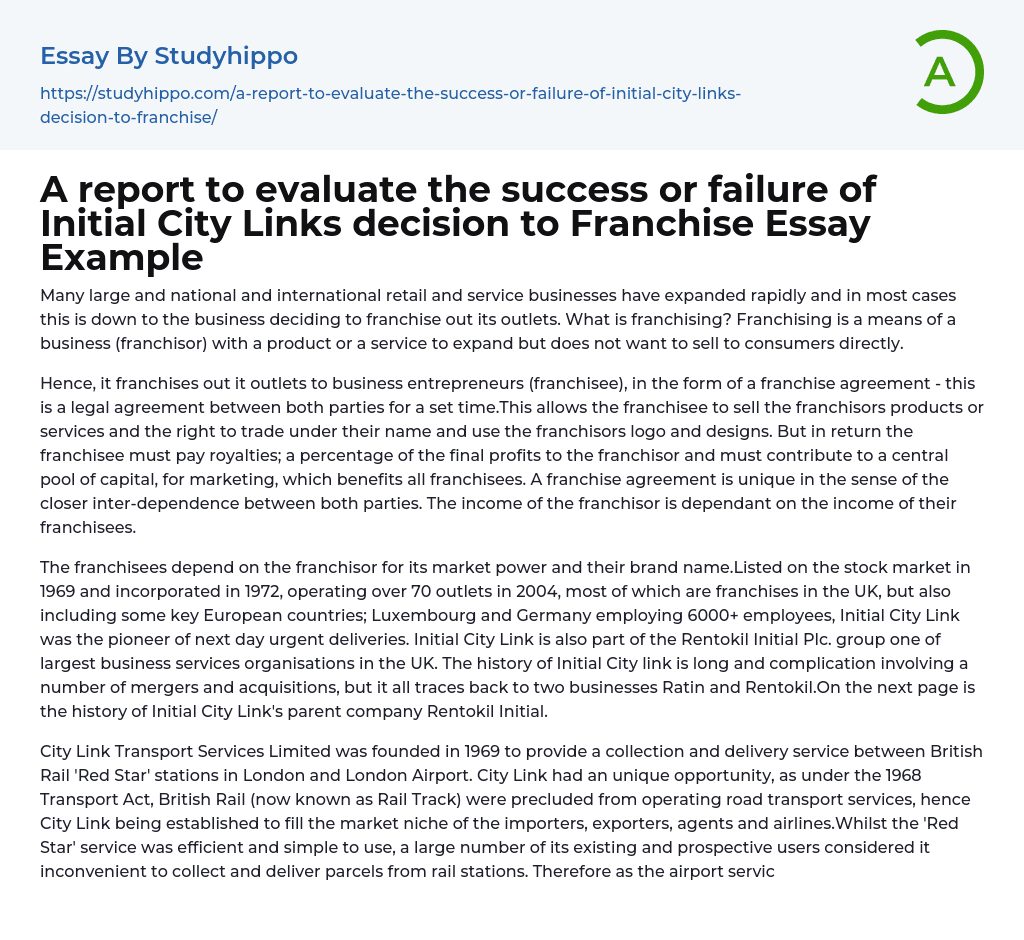Franchising has enabled numerous national and international retail and service companies to expand rapidly by franchising their outlets. Essentially, franchising entails a business (i.e., franchisor) with a product or service that desires to broaden its reach but not through direct sales to consumers.
Franchising involves a franchise agreement between the franchisor and franchisee, allowing the latter to sell the products or services of the former and trade under their name and logo. The franchisee pays royalties and contributes to a capital pool for marketing that benefits all franchisees. This agreement creates a close inter-dependence between both parties, with the franchisor's income being dependent on the success of their franchisees.
The franchisor is relied upon by franchisees for their brand name and market influence. Initial City Link, which went public in 1969 and became inc
...orporated in 1972, operates over 70 outlets in various countries such as the UK, Luxembourg, and Germany, and has an employee count of over 6,000. The company is renowned as a pioneer in time-sensitive delivery service. Additionally, Initial City Link is part of Rentokil Initial Plc., a leading business services organization in the UK. Although the history of Initial City Link is complex due to mergers and acquisitions, it can be traced back to two separate companies, Ratin and Rentokil. To learn more about Rentokil Initial, refer to the following page.
In 1969, City Link Transport Services Limited was established with the aim of providing a collection and delivery service between London Airport and British Rail's 'Red Star' stations. This was made possible due to a legal restriction that prevented British Rail (now Rail Track) from operating road transport services as per the 1968 Transport
Act. City Link recognized the market niche for importers, exporters, agents, and airlines and thus filled the gap. While the 'Red Star' service was efficient, many prospective and current users found it inconvenient to collect and deliver parcels from rail stations. Consequently, with rising demand, City Link started offering similar services at other major city centers across the UK through the appointment of 150 agents. In 1972, to better manage the administrative and operational aspects of the company, City Link Transport Holdings Limited was formed.
City Link experienced rapid expansion and reached a critical stage where standardizing operational and logistical procedures became necessary to sustain its size and growth rate. To achieve this, a franchise scheme was implemented, despite the tricky issue of whether franchising was suitable for its operations. A franchise zone, such as Tunbridge Wells, Maidstone, Newcastle, Sunderland etc., was sold instead of a single franchise agreement for an outlet. This meant that running a franchise was not a small operation with 3-5 employees for a single outlet.
Running a franchise for a delivery company such as Initial City Link requires managing a workforce of about 50-150 and depots over 17,500 square feet. Due to the interconnected nature of the franchise, one franchisee's success is dependent on another's, which in turn affects the overall profit for both the franchisee and the parent company. In order to ensure successful franchise operations, potential franchisees must be thoroughly vetted and interviewed, which is why the directors at Initial City Link take a highly involved approach. This differs from a single outlet franchise agreement where failure of one outlet would not significantly harm the image or profits of
the company.
However, there are advantages to this system. If a franchisee's territory experiences a downturn in business, they can still earn some income by delivering parcels for other franchisees whose areas are receiving a "normal" level of business. Initial City Link operates according to this principle, with prices pre-determined and set by the Head Office and issued to all franchisees. Franchisees must adhere to this price list. If deliveries are within the franchisee's own area, they retain 100% of the cost (*royalties to be paid). But if the delivery address is outside of the franchisee's area, payment is made to the franchisee who carries out the delivery.
- Chief Executive Officer essays
- Convenience Store essays
- Firm essays
- Training And Development essays
- Unilever essays
- Variable Cost essays
- Virgin Group essays
- Bargaining essays
- Entity essays
- Pest analysis essays
- New York City essays
- Advertising essays
- Audience Theory essays
- Competitor Analysis essays
- Consumer essays
- Marketing Management essays
- Marketing Mix essays
- Marketing Plan essays
- Marketing Research essays
- Marketing Strategy essays
- Point Of Sale essays
- Price essays
- Procurement essays
- Product essays
- Product Differentiation essays
- Promotion essays
- Promotion And Marketing Communications essays
- Retailing essays
- Trademark essays
- Anheuser-busch essays
- Brands essays
- Detergent essays
- Product Placement essays
- Research Design essays
- New Product Development essays
- Advertisement essays
- Brand essays
- Sales Promotion essays
- Advertising campaign essays
- Consumer behaviour essays
- Offer And Acceptance essays
- Wal-Mart essays
- Discover essays
- John Locke essays
- 9/11 essays
- A Good Teacher essays
- A Healthy Diet essays
- A Modest Proposal essays
- A&P essays
- Academic Achievement essays




